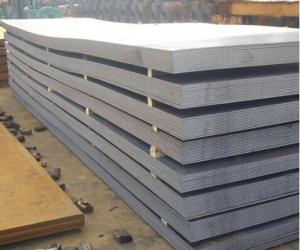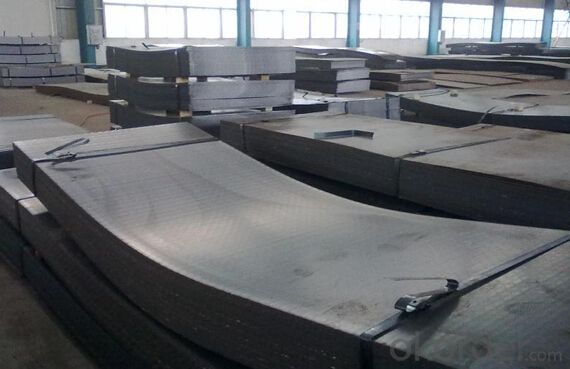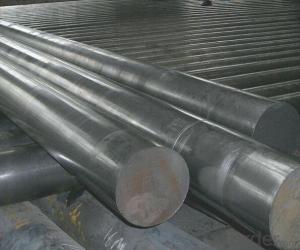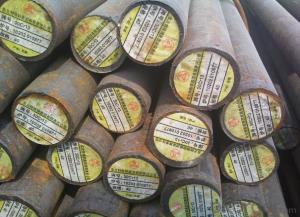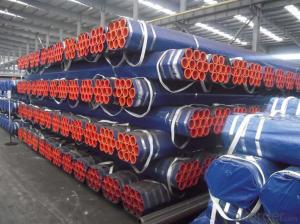Grade st 52.3 Mild Steel Plate Astm A36/ST37/ST52
- Loading Port:
- Tianjin
- Payment Terms:
- TT OR LC
- Min Order Qty:
- 3 m.t.
- Supply Capability:
- 100000 m.t./month
OKorder Service Pledge
OKorder Financial Service
You Might Also Like
Specification
Grade st 52.3 Mild Steel Plate Astm A36/ST37/ST52
Detailed Information of Grade st 52.3 Mild Steel Plate Astm A36/ST37/ST52
| C | Si | P | S | yield Strength MAp | Tensile strength MAp | Elongation % | ||
| A36 | 0.24 | 0.4 | 0.045 | 0.03 | 250 | 400-520 | 26 | |
| C | Si | Mn | P | S | Cu | |||
| A283 | ≤0.27 | 0.15-0.4 | ≤0.9 | ≤0.035 | ≤0.04 | ≥0.2 | ||
| Thickness: | 6mm, 8mm, 12mm, 16mm, 20mm, 25mm, 30mm, 50mm, 80mm, 100mm, 150mm, 200mm | |||||||
| Width: | 1500mm, 1800mm, 2000mm, 2200mm, 2500mm | |||||||
| Length: | 6000mm, 8000m, can cut to width and length | |||||||
| Packing Details; | according to customer‘s require or export’s standard | |||||||
| Delivery time; | 7 days for stock sizes, 20-25 days for new production sizes | |||||||
| Port: | Tianjin China | |||||||
Related Products Overviews of Grade st 52.3 Mild Steel Plate Astm A36/ST37/ST52
Product Name | Typical Grades | Diameter(mm) | Standard Adopted |
Carbon Steel | 20 (1020/S20C/C22) |
Ø16-Ø300 |
GB/SAE/ JIS/DIN |
40 (1040/S40C/C40) | |||
45 (1045/S45C/C45) | |||
Bearing Steel | GCr9 (51100/SUJ1) |
Ø12-Ø250 | |
GCr15 (52100/SUJ2/100Gr6) | |||
GCr9SiMn (A485-Gr.1/SUJ3) | |||
Cr-Mo Steel | 20Cr (5120/SCr420H/20Cr4) |
Ø12-Ø250 | |
40Cr (5140/SCr440/41Cr4) | |||
42CrMo(4140/SCM440/42CrMo4) | |||
Gear Steel | 20CrNiMo |
Ø16-Ø600 | |
20CrMn(5115/SMnC420/20MnCr5) | |||
20CrNiMo(8620/SNCM220/20CrMiMo2) |
Related Products Application of Grade st 52.3 Mild Steel Plate Astm A36/ST37/ST52
Carbon Steel | l Mold bottom l Plastic mold l Construction machinery parts l Automobile parts l Security grills l Screens l Construction |
Bearing Steel | l Aerospace l Navigation l Nuclear energy l Chemical industry l Electronic information l Petrochemical l Instrument and meter l Transportation |
Cr-Mo Steel | l Mechanism & Fasteners gear l Stressed components for vehicles l Engines and machines l Parts of larger cross-section |
Gear Steel | l All kinds of gears l Statically and dynamically stressed component for vehicles l Engines and machine l Larger cross-section parts l Crankshafts |
Company Introduction of Grade st 52.3 Mild Steel Plate Astm A36/ST37/ST52
CNBM International Corporation is the most import and export platform of CNBM group(China National Building Material Group Corporation) ,which is a state-owned enterprise, ranked in 270th of Fortune Global 500 in 2015.
With its advantages, CNBM International are mainly concentrate on Cement, Glass, Iron and Steel, Ceramics industries and devotes herself for supplying high quality series of refractories as well as technical consultancies and logistics solution.
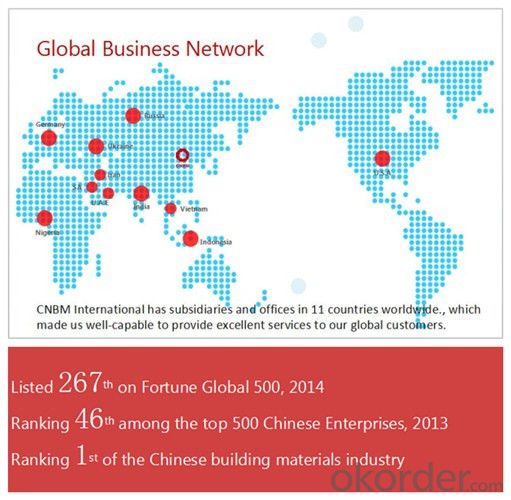
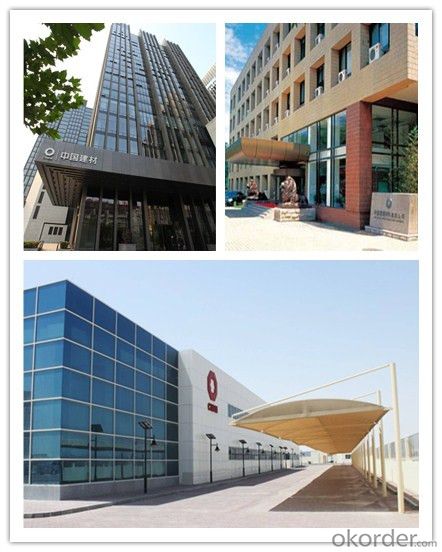
After-sale service | l CNBM provides the services and support you need for every step of our cooperation. We’re the business partners you can trust; you can relax and get on with doing business. l For any problem, please kindly contact us at any your convenient time, we’ll reply you in our first priority within 24 hours
|
Advantages
| l Industry experience over 20 years. l Shipment of goods -More than 70 countries worldwide. l The most convenient transport and prompt delivery. l Competitive price with best service. l High technical production line with top quality products. l High reputation based on best quality products.
|
Packaging & Delivery of Grade st 52.3 Mild Steel Plate Astm A36/ST37/ST52
Packaging Detail | Sea worthy packing /as per customer's packing instruction |
Delivery Detail | 15 ~ 40 days after receiving the deposit |
Products Show
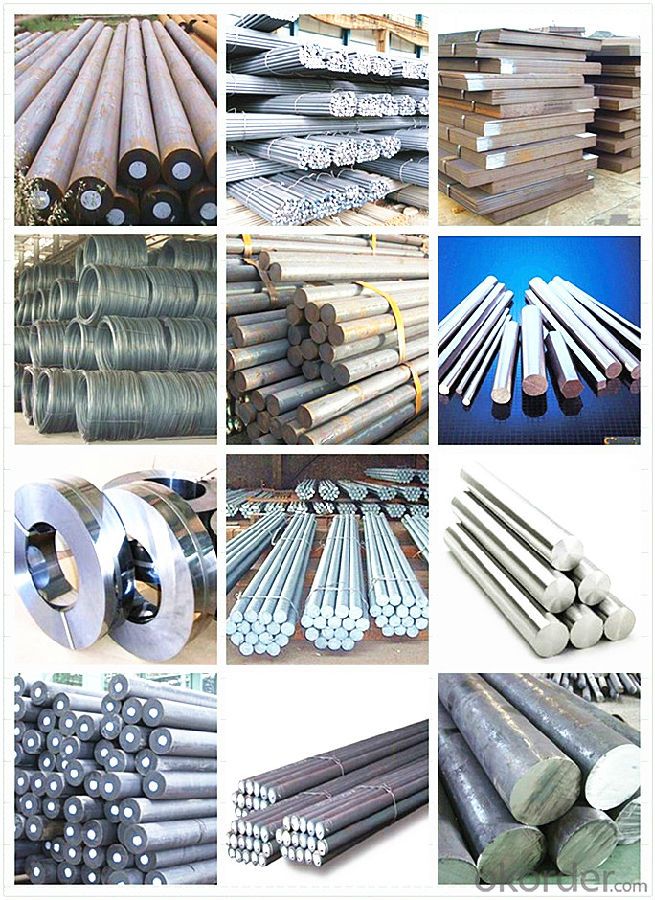
FAQ:
Are you a trading company or manufacturer? | Manufacturer |
What’s the MOQ? | 3 metric ton |
What’s your delivery time? | 15-35 days after downpayment received |
Do you Accept OEM service? | Yes |
what’s your delivery terms? | FOB/CFR/CIF |
What's the Payment Terms? | 30% as deposit,70% before shipment by T/T |
Western Union acceptable for small amount. | |
L/C acceptable for large amount. | |
Scrow ,Paybal,Alipay are also ok | |
Why choose us? | Chose happens because of quality, then price, We can give you both. Additionally, we can also offer professional products inquiry, products knowledge train (for agents), smooth goods delivery, excellent customer solution proposals. |
What's your available port of Shipment? | Main Port, China |
What’s your featured services? | Our service formula: good quality+ good price+ good service=customer's trust
|
Where are your Market? | Covering more than 160 countries in the world |
- Q: Can special steel be used in the battery manufacturing industry?
- Yes, special steel can be used in the battery manufacturing industry. Special steel is often used in battery production for various purposes, such as in the construction of battery casings, terminals, and other components. Its high strength, durability, and resistance to corrosion make it suitable for ensuring the safety and longevity of batteries.
- Q: What are the typical mechanical properties of special steel?
- The typical mechanical properties of special steel may vary depending on the specific grade and composition of the steel, but there are some general characteristics that can be expected. Special steels are often designed to have enhanced properties compared to standard carbon steels, making them suitable for specific applications that require superior strength, hardness, or resistance to wear and corrosion. One of the key mechanical properties of special steel is its high tensile strength. Special steels are typically engineered to have higher strength levels than standard steels, enabling them to withstand heavy loads and stresses without deformation or failure. This makes them ideal for use in industries such as construction, automotive, and aerospace, where structural integrity is crucial. Special steels also exhibit excellent hardness, which is a measure of a material's resistance to permanent indentation or scratching. This property is often achieved through alloying elements and heat treatment processes that increase the steel's ability to resist wear and abrasion. Consequently, special steels are commonly used in tools, cutting equipment, and machinery components that are subjected to severe wear conditions. Moreover, special steel alloys can possess exceptional toughness, which refers to the material's ability to absorb energy and resist fracture under impact or sudden loading. This is particularly important in applications where impact resistance is vital, such as in the manufacturing of heavy-duty machinery or structures subjected to dynamic loads. In addition to strength, hardness, and toughness, special steels may also exhibit improved corrosion resistance compared to standard steels. This is achieved by incorporating alloying elements such as chromium, nickel, or molybdenum, which create a protective oxide layer on the surface of the steel, preventing or slowing down the process of corrosion. This property is highly desirable in industries that deal with corrosive environments, such as marine, oil and gas, and chemical processing. In summary, the typical mechanical properties of special steel include high tensile strength, excellent hardness, exceptional toughness, and improved corrosion resistance. These properties enable special steels to excel in various applications where superior performance is required, making them essential in numerous industries around the world.
- Q: What are the properties of wear-resistant stainless steel?
- Wear-resistant stainless steel has several properties that make it highly effective in resisting wear and tear. Firstly, it has a high hardness level, which allows it to withstand abrasive forces and maintain its shape under heavy loads. Additionally, it exhibits excellent corrosion resistance, preventing rust or degradation even in harsh environments. This type of stainless steel also possesses good impact resistance, meaning it can withstand sudden impacts without cracking or breaking. Furthermore, wear-resistant stainless steel typically has a low coefficient of friction, reducing frictional forces and minimizing wear when in contact with other materials. Overall, these properties make wear-resistant stainless steel a durable and reliable choice for applications where wear and tear are major concerns.
- Q: How does special steel contribute to the agriculture industry?
- Special steel plays a crucial role in the agriculture industry by providing durable and high-performance materials for various agricultural machinery and equipment. These steels are specifically designed to withstand the harsh conditions and heavy workloads encountered in farming operations, resulting in increased efficiency and productivity. One of the primary applications of special steel in agriculture is in the manufacturing of tillage equipment such as plows, cultivators, and harrows. These implements require robust materials that can withstand the abrasion and impact of soil and rocks. Special steel provides the necessary strength and hardness to ensure that these implements can effectively break up the soil, improve soil quality, and prepare the land for planting. Additionally, special steel is extensively used in the production of machinery for planting, harvesting, and processing agricultural products. For instance, combine harvesters, which are vital for large-scale crop harvesting, heavily rely on special steel components for their cutting systems, threshing mechanisms, and grain handling systems. By using special steel, these machines can efficiently handle the demanding tasks of crop collection, separation, and storage. Moreover, special steel contributes to the agriculture industry by enhancing the longevity and reliability of equipment. Agricultural machinery operates in challenging environments that expose them to corrosive elements, moisture, and extreme temperatures. Special steel, often coated with protective layers, offers resistance against corrosion, rust, and wear, ultimately extending the lifespan of agricultural equipment. Furthermore, the use of special steel in the manufacturing of machinery leads to improved precision and accuracy in agricultural operations. Modern farming techniques increasingly rely on precision agriculture, which involves using advanced technologies to optimize productivity, reduce waste, and conserve resources. Special steel components enable more precise movements, better control, and increased accuracy in machinery, leading to improved efficiency and minimizing waste. Overall, special steel is vital to the agriculture industry as it provides the necessary strength, durability, and precision required for various agricultural machinery and equipment. By utilizing these high-quality materials, farmers can enhance productivity, reduce downtime, and achieve sustainable farming practices.
- Q: How does special steel contribute to the energy equipment industry?
- Special steel plays a crucial role in the energy equipment industry by providing materials with superior strength, durability, and corrosion resistance. These properties enable the production of high-performance components such as turbine blades, pressure vessels, and pipelines, which are essential for power generation, transmission, and distribution. Additionally, special steel's ability to withstand extreme temperatures and harsh operating conditions enhances the efficiency and reliability of energy equipment, ultimately contributing to the overall sustainability and advancement of the industry.
- Q: How does special steel contribute to reducing product weight?
- Special steel contributes to reducing product weight through its unique properties. Special steel is known for its high strength-to-weight ratio, allowing manufacturers to use thinner and lighter steel components without compromising on strength and durability. This means that products made with special steel can be designed with reduced material thickness, resulting in overall weight reduction. Additionally, special steel's excellent corrosion resistance properties can eliminate the need for additional protective coatings, further reducing the product's weight.
- Q: What are the different methods for electroplating special steel?
- There are several methods for electroplating special steel, depending on the specific requirements and desired outcome. Here are some of the different methods commonly used in electroplating special steel: 1. Electroless Nickel Plating: This method involves the use of a chemical reaction to deposit a layer of nickel onto the steel surface. It is a popular choice for achieving uniform and corrosion-resistant coatings on special steel. 2. Zinc Plating: Zinc plating is widely used to provide a protective layer on special steel. It involves the immersion of the steel in a zinc solution and passing an electric current to facilitate the deposition of zinc onto the surface. 3. Copper Plating: Copper plating is used to enhance the conductivity and corrosion resistance of special steel. It involves immersing the steel in a copper sulfate solution and applying an electric current to deposit a layer of copper onto the surface. 4. Chromium Plating: Chromium plating is a common method used to provide a decorative, corrosion-resistant, and hard-wearing surface on special steel. It involves the immersion of the steel in a chromium bath and the application of an electric current to deposit a layer of chromium onto the surface. 5. Electroplating with Precious Metals: Special steel can also be electroplated with precious metals such as gold, silver, or platinum for decorative or functional purposes. These coatings are often used to enhance the appearance, conductivity, or corrosion resistance of the steel. 6. Electroplating with Alloy Coatings: For specific applications, special steel can be electroplated with alloy coatings, such as tin-zinc or tin-lead, to provide unique properties such as enhanced solderability or improved wear resistance. It is important to note that the choice of electroplating method depends on factors such as the desired properties, the intended application, and the specific requirements of the special steel being plated. Each method has its advantages and limitations, and it is recommended to consult with experts in the field to determine the most suitable method for electroplating special steel in a given scenario.
- Q: How does special steel compare to stainless steel?
- Special steel and stainless steel differ in terms of their composition and properties. Special steel refers to a broad category of high-performance steels that possess unique characteristics, such as increased strength, toughness, heat resistance, or corrosion resistance. On the other hand, stainless steel is a specific type of steel alloy that is highly resistant to corrosion and staining. While special steel can exhibit superior mechanical properties, stainless steel excels in its resistance to rust and oxidation. Ultimately, the choice between the two depends on the specific application and the desired properties required.
- Q: What are the different methods of surface grinding for special steel?
- There are several different methods of surface grinding that can be used for special steel. Here are some of the most commonly utilized methods: 1. Blanchard Grinding: This method involves using a rotary table and a grinding wheel to remove material from the surface of the steel. The grinding wheel is typically made of abrasive particles bonded together in a matrix and rotates at a high speed. Blanchard grinding is known for its ability to quickly and efficiently remove large amounts of material, making it suitable for roughing operations. 2. Precision Grinding: This method is often used for finishing operations, where a high degree of accuracy and surface finish is required. Precision grinding involves using a surface grinder with a fine-grit grinding wheel to remove a small amount of material from the surface of the steel. This process is typically slower and more precise than Blanchard grinding, resulting in a smoother and more polished surface. 3. Centerless Grinding: This method is commonly used for cylindrical steel parts that require a high degree of precision. Centerless grinding involves feeding the steel between a grinding wheel and a regulating wheel, with the grinding wheel removing material from the surface as it rotates. The regulating wheel controls the speed and feed rate of the steel, ensuring consistent and accurate grinding. 4. Creep Feed Grinding: This method is used for heavy stock removal on large steel parts. Creep feed grinding involves using a slow feed rate and deep cuts to remove material from the surface. This method is typically used for specialized applications where traditional surface grinding methods are not suitable due to the size or complexity of the steel part. Overall, the choice of surface grinding method for special steel will depend on factors such as the desired surface finish, accuracy requirements, and the size and complexity of the steel part. It is important to consult with a skilled grinding professional to determine the most appropriate method for a specific application.
- Q: What are the requirements for special steel used in energy equipment manufacturing?
- The requirements for special steel used in energy equipment manufacturing are quite stringent and specific. These steels need to possess a set of characteristics that make them suitable for handling the extreme conditions and demands of energy equipment. Firstly, high strength is a crucial requirement for special steel used in energy equipment manufacturing. These steels must have excellent mechanical properties, including high tensile strength and good toughness. This is necessary to withstand the heavy loads, pressure, and stresses that energy equipment such as turbines, generators, and power transmission systems experience. Secondly, special steels used in energy equipment manufacturing must exhibit exceptional heat resistance. They need to maintain their structural integrity and mechanical properties at elevated temperatures. This is because energy equipment operates under high-temperature conditions, especially components like boiler tubes and heat exchangers. Heat-resistant steels with high melting points and low thermal expansion are thus vital. Corrosion resistance is another crucial requirement for special steel used in energy equipment manufacturing. Energy equipment is often exposed to harsh environments, including corrosive gases, fluids, and high humidity. Therefore, the special steels used should have excellent resistance to corrosion, oxidation, and erosion. This ensures the longevity and reliability of the energy equipment, reducing maintenance and replacement costs. Good weldability and machinability are also essential characteristics of special steels used in energy equipment manufacturing. Energy equipment often requires complex fabrication processes and weldments. Therefore, these steels should possess good weldability to ensure easy and reliable joining. Similarly, machinability is crucial for the production of energy equipment components, as it allows for efficient shaping and finishing. Lastly, special steel used in energy equipment manufacturing must comply with strict quality and safety standards. They should adhere to international codes and regulations, such as those set by organizations like the American Society of Mechanical Engineers (ASME) and the International Electrotechnical Commission (IEC). These standards ensure that the special steels meet the necessary specifications and performance requirements for energy equipment, promoting safety and reliability. In conclusion, the requirements for special steel used in energy equipment manufacturing include high strength, heat resistance, corrosion resistance, weldability, machinability, and compliance with quality and safety standards. Meeting these requirements ensures that the special steels can withstand the extreme conditions and demands of energy equipment, ensuring their longevity, reliability, and safety.
Send your message to us
Grade st 52.3 Mild Steel Plate Astm A36/ST37/ST52
- Loading Port:
- Tianjin
- Payment Terms:
- TT OR LC
- Min Order Qty:
- 3 m.t.
- Supply Capability:
- 100000 m.t./month
OKorder Service Pledge
OKorder Financial Service
Similar products
Hot products
Hot Searches
Related keywords
